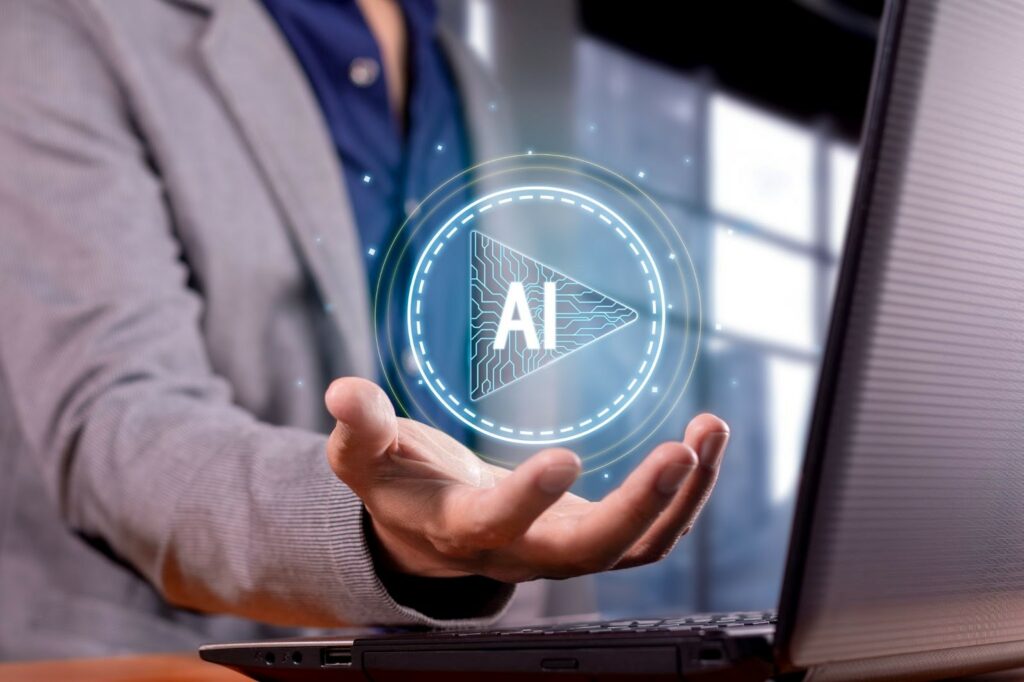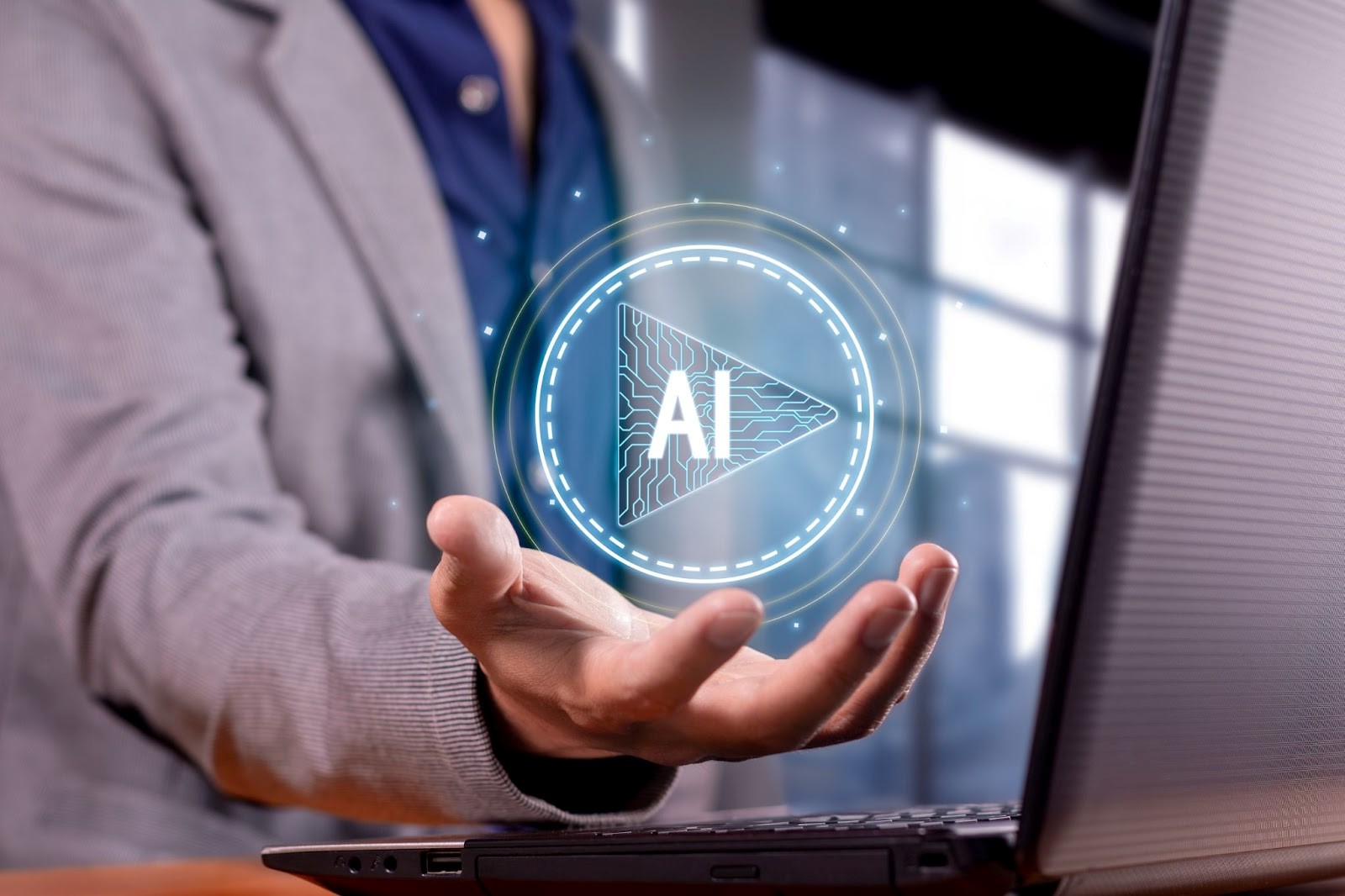Artificial intelligence (AI) ‘s impact on modern day advertising is significant. Various industries, including advertising, have been revolutionized by AI. Today’s businesses leverage AI to enhance their marketing strategies and establish deeper consumer connections.
With the advancement of AI-powered tools and technologies, advertisers must grasp the implications and potential of AI in their field.
In this article, we will delve into the growing presence of AI in advertising, its inevitability, advantages and disadvantages, real-world examples and its future role at the forefront of advertising.
The Growing Presence of AI in Advertising

AI is progressively playing a role in reshaping how brands engage with their target audience through advertising. According to a study by Salesforce, 60% of marketers already utilize AI to optimize their ad campaigns—a number projected to rise in the coming years. As AI algorithms advance, advertising platforms are becoming more efficient at targeting audiences, delivering content and maximizing the impact of each ad investment.
Programmatic advertising powered by AI serves as an illustration of how this technology is transforming the industry. Programmatic advertising empowers brands to automate purchasing ads and utilize AI algorithms to make data driven decisions in time. This allows businesses to effectively connect with their desired audience resulting in conversion rates and return on investment.
Programmatic advertising uses AI and machine learning to automate advertisements’ purchasing, placement and optimization. It relies on algorithms that analyze amounts of data, such as user behavior, demographics and browsing history. These algorithms determine the appropriate and impactful ads to display to each user.
To accomplish this, programmatic advertising platforms employ real-time bidding (RTB) protocols that decide which ad should be shown to a user when a user visits a website at any given moment. Opens an app, an auction occurs within milliseconds where advertisers compete to display their ad to that user. The AI algorithms assess factors, including the user’s profile, website or app context, and the advertisers’ budget, to determine the winning bid and display the most relevant advertisement.
By leveraging AI technology alongside advertising strategies, brands can not only effectively target their desired audience but also deliver personalized ads that are contextually relevant. For instance, when someone searches for vacation spots, programmatic advertising can show them ads about travel deals or vacation packages. This increases the likelihood of converting those users into customers. This level of personalization and relevance elevates the user experience. Boosts the effectiveness of advertising campaigns.
There are reasons why AI is becoming inevitable in advertising. One is the growing amount of data and the need to provide customized marketing experiences. As consumers become more selective and expect tailored interactions, brands must use AI to deliver personalized content on a scale. According to a survey conducted by Accenture, 83% of consumers are open to sharing their data to enable experiences. With AI-powered tools, advertisers can analyze this amount of data. Extract invaluable insights that allow them to create highly targeted campaigns that resonate with their audience.
Furthermore, AI can also assist advertisers in optimizing their ad spending by predicting consumer behavior and identifying channels and messaging strategies. By utilizing AI algorithms, advertisers can identify patterns in consumer data, optimize bidding strategies and allocate resources efficiently. This not only maximizes return, on investment but minimizes wasteful ad spending.
One of the benefits of incorporating AI into advertising is its ability to automate tasks, allowing marketers to dedicate more time to strategic thinking and creative endeavors. For instance AI powered chatbots can efficiently handle customer inquiries. Offer recommendations, thereby enhancing the overall customer experience. This does not boost customer satisfaction. Also empowers marketers to gather valuable insights into customer preferences and behaviors.
AI can potentially revolutionize the creation and delivery of advertisements. Through AI-generated content, advertisers can swiftly generate ad variations, test them in time and optimize them for maximum impact. This dynamic approach fosters improvement. Ensures that ads are consistently relevant and captivating.
AI plays a role in enhancing ad targeting and segmentation. AI algorithms can precisely identify specific audience segments by analyzing behavioral and contextual data. This empowers advertisers to deliver personalized ads directly to the individuals at the right moment through suitable channels. The outcome is increased engagement levels, higher conversion rates, and improved return on investment (ROI).
In conclusion, integrating AI into advertising is not merely inevitable but crucial for brands striving to remain competitive in today’s landscape.
Also Read: Craft Your 2024 AI Marketing Strategy: A Comprehensive Guide
Pros and Cons of AI in Advertising

Artificial Intelligence (AI) has brought about a revolution in the advertising industry by offering a multitude of benefits while also raising concerns.
- Automation & Efficiency: On the side one of the advantages of AI is its ability to automate repetitive tasks. This frees up time for advertisers to concentrate on strategic and creative aspects of their campaigns. Taking over tasks such as data analysis and reporting, AI empowers advertisers to channel their energy into crafting innovative marketing strategies.
- Accurate Data Analysis: AI’s capacity for accurate analysis of amounts of data provides advertisers with invaluable insights. By sifting through consumer data sets, AI algorithms can identify patterns, preferences and trends that may go unnoticed by humans. This data-driven approach equips advertisers with the knowledge to make decisions and optimize their advertising strategies for impact.
- Personalization: AI can also customize marketing messages. By utilizing AI algorithms, advertisers can tailor their ads to suit each consumer ensuring that the right message reaches the person at the time. This personalized approach strengthens customer engagement and nurtures brand loyalty. Ultimately leads to conversion rates.
However, despite these advantages, it is important not to overlook concerns related to the use of AI in advertising. One of the challenges is maintaining ethical practices when it comes to data privacy and security. Advertisers must navigate a landscape of regulations. Ensure they obtain proper consent from users before collecting and utilizing their information. Striking a balance between personalization and privacy is crucial to establishing and maintaining consumer trust.
Additionally, a risk is associated with relying heavily on AI without sufficient human oversight. While AI algorithms are tools, they are not immune to biases or discriminatory practices. Without intervention, there is a possibility of perpetuating biased targeting that could have serious consequences for advertisers and consumers. It is essential to foster a relationship between AI technology and human expertise to ensure fairness and accountability in advertising practices.
AI holds potential within the advertising industry by enabling automated data analysis and personalized approaches.
However, advertisers must exercise caution when implementing AI, addressing ethical considerations and striking the balance between automation and human involvement. This approach allows the advertising industry to harness the potential of AI while maintaining standards and delivering campaigns.
How Giant Companies are Leveraging AI
There are examples of known brands that have successfully incorporated AI into their marketing strategies, such as Amazon, Coca-Cola, Heinz, Nutella and Netflix.
Amazon utilizes AI algorithms to personalize product recommendations for customers. Amazon’s recommendation engine suggests tailored products that enhance the customer experience and boost sales by analyzing purchase history, browsing behavior, and other relevant data points.
Coca-Cola is another brand that embraces AI in its advertising efforts. The company employs AI-powered image recognition technology to identify and track its product’s visibility in social media content. This capability enables Coca-Cola to analyze the impact of influencer marketing campaigns and measure their brand presence’s effectiveness, on platforms.
Heinz, renowned for its ketchup and condiment products, leverages AI to optimize its advertising campaigns. By harnessing AI’s power, Heinz can identify ad creatives, placements, and target audience segments.
This enables them to effectively allocate their marketing budget and achieve campaign performance. Nutella, the loved hazelnut spread brand, leverages AI technology to create customer recipes. By analyzing preferences and dietary restrictions, Nutella’s AI-powered platform generates recipes that align with each person’s taste and nutritional needs. This not only enhances customer engagement but fosters loyalty towards the brand.
The popular streaming platform of Netflix uses AI to provide personalized content recommendations to its subscribers. By analyzing their viewing habits, search history, and user ratings, Netflix’s recommendation algorithm suggests movies and TV shows tailored to each user’s preferences. This level of personalization significantly improves the user experience. Encourages engagement with the platform.
Moreover, Amazon goes beyond recommendations by employing AI-powered chatbots for customer support. These chatbots can understand and respond to customer inquiries promptly and efficiently. This does not enhance customer satisfaction. Also reduces the workload of human customer service representatives, allowing them to focus on more complex issues.
In addition to Coca-Cola’s utilization of AI in influencer marketing campaigns, they also use AI technology to optimize their advertising content.
By examining how consumers behave and analyzing their sentiments Coca Cola can develop advertisements that deeply connect with their intended audience. This enables the brand to create emotionally captivating campaigns, leading to heightened brand recognition and increased customer loyalty.
AI in Advertising: Opportunities & Challenges

Using AI in advertising brings forth both opportunities and challenges for businesses. On the side, AI driven advertising allows brands to better identify and reach target audiences. AI algorithms can uncover hidden trends and preferences by analyzing user data, enabling businesses to customize their messages.
In addition, AI can automate A/B testing, which helps advertisers quickly identify the variations of their ads and optimize their campaigns in real-time. Programmatic advertising platforms, through machine learning algorithms, can learn from performances. Continuously enhance ad targeting and delivery.
Nevertheless, there are challenges associated with AI-driven advertising. One such challenge is ad fraud, a concern in the digital advertising industry. To address this issue AI powered tools can. Flag activities in real-time to prevent advertisers’ budgets from being wasted on fraudulent impressions or clicks.
Another challenge lies in the potential for AI-driven advertising to contribute to filter bubbles where consumers are exposed to content that reinforces their existing beliefs and preferences. Advertisers must know this and strive for diversity and inclusivity in their targeting strategies. Advertisers can utilize AI technology to promote decision-making and foster balanced perspectives by incorporating guidelines and human oversight.
Furthermore, leveraging AI-driven advertising opens up opportunities for creativity and innovation. With the help of AI algorithms for generating personalized content, advertisers can create engaging advertisements that resonate with individual consumers on a deeper level.
By harnessing the power of AI to analyze amounts of data, marketers can gain insights into how consumers behave and what they prefer. This enables them to create stories that evoke emotions and foster brand loyalty.
Another advantage of AI-driven advertising is the potential for experiences. By using AI algorithms to analyze user data in time marketers can deliver targeted and relevant ads to consumers at the right moment and through the most effective channels. This level of personalization does not enhance user satisfaction. Also increases the chances of conversions.
However, addressing privacy and data security concerns in AI-driven advertising is crucial. Since AI relies heavily on user information, marketers must prioritize safeguarding data and complying with regulations. Implementing security measures and obtaining user consent are vital to building trust and maintaining transparent consumer relationships.
To sum up, AI-powered advertising offers businesses opportunities to optimize their marketing strategies and establish connections with their target audiences. By leveraging AI capabilities while proactively addressing challenges, marketers can navigate the changing advertising landscape and unlock new avenues for growth and success.
The Future of Advertising: AI Taking the Lead
When we look ahead, it’s evident that AI will continue to shape the future of advertising. As AI technologies progress, advertisers can expect a range of tools and capabilities at their disposal. For example, chatbots utilizing natural language processing (NLP) can deliver customer support. Boost sales through conversational marketing.
Advancements in computer vision technology will also empower AI to analyze visual content like images and videos for enhanced ad targeting and contextual relevance. Brands can leverage AI-powered image recognition to identify elements within visuals, leading to precise ad placement and personalization.
Moreover, predictive analytics driven by AI will play a role in aiding advertisers in anticipating consumer behavior and adjusting their strategies accordingly. By analyzing data and market trends, AI algorithms can provide insights that inform campaign planning and budget allocation, resulting in more effective and efficient advertising.
Imagine a future where AI helps advertisers better target their audience and creates ad experiences for each individual. With advancements in AI technology, advertisers can customize their messaging and creative elements based on the preferences and interests of every consumer.
This level of customization will not just improve the user experience. Also boosts the effectiveness of advertising campaigns. Additionally, AI-powered advertising platforms will be able to optimize ad placement in time, ensuring that the right message reaches the person at the right moment. Analyzing how users behave and engage, AI algorithms can dynamically adjust where and how ads appear to maximize conversions and return on investment (ROI). This high level of flexibility and adaptability will transform how advertisers connect with their intended audience.
Moreover, AI will enable advertisers to tap into the power of recognizing emotions. By analyzing expressions, tone of voice, and other nonverbal cues AI algorithms can determine how individuals emotionally respond to advertisements. This valuable data can then be used to refine and optimize ad content, guaranteeing that it resonates with consumers on a level.
To summarize, the future of advertising is heavily influenced by AI. Its ability to offer experiences, optimize ad delivery in time, and utilize emotion recognition capabilities allows AI to push beyond conventional boundaries in the advertising world. Advertisers who embrace these technologies do not stay ahead of their competition. Also, establish more meaningful connections with their target audience.
Final Words
In summary, AI is poised to make an impact on the field of advertising. As AI technology continues to advance and become more accessible, advertisers must. Embrace these tools to remain relevant and competitive in the evolving digital landscape. From advertising to tailored content recommendations, AI presents opportunities for businesses to establish meaningful connections with their target audience.
However, advertisers must navigate the challenges and ethical considerations that accompany the use of AI in advertising. By adopting responsible practices, advertisers can ensure that AI is utilized to enhance customer experiences and drive outcomes. As we look ahead to the future of advertising, it is clear that AI will play a role in empowering brands to deliver personalized marketing campaigns.
If you’re a business owner who wants to stay ahead of the game, schedule a free consultation with our AI marketing team.



